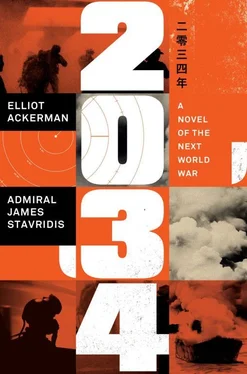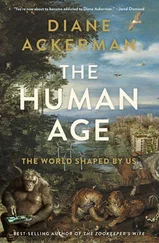The lieutenant colonel was sipping a pale beer poured into a frosted glass, his massive shoulders hunched over the bar. His chest was littered with ribbons and badges, to include gold flight wings, and he wore his service alpha uniform, so he was either headed to or coming from a meeting with a more senior officer—probably the commanding general, Wedge guessed. And from the colonel’s loosened tie and hangdog expression, Wedge intuited that the meeting had not gone well. The colonel lifted a newspaper that Wedge had left at the bar. “You mind?” he asked.
“All yours, sir,” said Wedge, who took a break from Galaga to perch himself on a nearby barstool.
The lieutenant colonel began to read, his forehead drawn into horizontal wrinkles. He pointed to an editorial’s headline: the us military’s irrelevant technological advantage. “You see this shit,” he said, flicking the page. Wedge noticed the walnut-sized Annapolis class ring he wore. “They’re calling us irrelevant.”
Wedge leaned a little closer, scanning the editorial, which advocated for a reduced reliance on high-tech platforms as a centerpiece of America’s defense strategy, particularly in light of recent “Sino aggression,” as the article euphemistically referred to the destruction of more than a quarter of the ships in the US Navy and what appeared like the inevitable loss of Taiwan. “Their argument isn’t that we are irrelevant,” said Wedge. “The argument is that our technology is getting in the way.”
The lieutenant colonel placed both of his hands, palms down, on the bar. His bushy Cro-Magnon eyebrows knitted together, as if he were having a hard time understanding how someone could be critical of his aircraft without being critical of him. “What are you doing at the o-club in the middle of the day, Major?”
Wedge nodded toward the Galaga machine. “Trying to beat the high score.”
The colonel laughed deeply from his stomach.
“How about you, sir?” asked Wedge. “What are you doing here?”
He stopped laughing. His eyebrows came together in the same prehistoric way as before. “Until a few days ago, I was the CO of VMFA-323.”
“The Death Rattlers,” said Wedge.
The colonel shrugged.
“I thought you guys were deployed on the Enterprise, ” added Wedge. He glanced down at the paper, to the bottom of page A3, where there was a photo of the Enterprise accompanying a lengthy reported piece on recent events in the South China Sea, which concluded that the US was, at this moment, outmatched. “What happened?”
“A real bitch of an admiral runs the carrier strike group, that’s what happened.” The colonel took a long pull on his beer, emptying the glass. He ordered up another and began to talk. “Hunt’s her name. She’s the one that got all those sailors from the John Paul Jones, Levin, and Chung-Hoon killed. I guess losing three ships is what qualifies as combat experience in the Navy these days. One morning, she shows up in our ready room and says I’ve got to rip all the avionics out of my Hornets, that it’s the only platform she’s got that can operate offline. According to her, when the time comes my guys and I are supposed to ‘fly by the seat of our pants’ against the Chinese fleet with dumb bombs and our sights grease-penciled onto the canopies of our cockpits. No fucking way.”
Wedge’s mouth turned dry. “What’d you tell her?”
“Just that. I said, ‘Ma’am, with all due respect, no fucking way.’ So here I am.”
“And who’s running the squadron?”
The lieutenant colonel rubbed his chin, as though the question hadn’t occurred to him. “Beats the shit out of me. No one, I guess. When I left, the Enterprise was cutting squares and the ground crews were ripping out the insides of our cockpits. No one was doing any flying.”
“They don’t have a CO?”
The colonel shook his head.
Wedge’s eyes opened very wide. He reached in his pocket and pulled out a crumple of bills and a fistful of the quarters he’d been pumping into the Galaga machine. He picked through it to settle his tab.
“Where you headed?” asked the colonel.
“I got to make a phone call.”
The colonel seemed disappointed.
“You want these quarters?” asked Wedge.
“What the fuck for?”
Wedge glanced over at the Galaga machine. “If you’re killing time here, I thought you might like to try for the high score.”
The colonel took a long pull on his second beer. He planted his near-empty glass on the bar. “Gimme that.” He snatched up the quarters and stormed over to the Galaga console. As Wedge left the officers’ club, he could hear the colonel cursing. The game seemed to be getting the better of him.

10:27 June 18, 2034 (GMT+8)
20 nautical miles off the coast of Taipei
Water sluiced through the creases of Lin Bao’s raincoat as he stood on the flight deck. On a clear day he would’ve been able to see the gleaming skyline in the distance. Now all he could see were the storm clouds that shrouded the city. Minister Chiang was scheduled to land any minute. The purpose of his visit wasn’t entirely clear; however, Lin Bao felt certain that the time had come to resolve their current stalemate with the Americans and the Taiwanese. The resolution to that stalemate was the news Lin Bao believed the minister would bring.
Flickering in the distance, Lin Bao made out a dim oscillating light.
Minister Chiang’s plane.
Pitching and yawing, it catapulted out of a rent in the clouds. Seconds later it was reeling on the deck, the pilots having perfectly caught the three-wire, much to Lin Bao’s satisfaction. The engines whined in reverse, decelerating. After a few moments, the back ramp dropped and Minister Chiang emerged, his round face laughing and smiling at the exhilaration of a carrier landing. One of the pilots helped the minister remove his cranial helmet, which caught on his large ears. The minister’s visit hadn’t been announced, but like a politician he began distributing handshakes to the ground crew, who eventually surmised who he was. Before any fuss could be made on account of his arrival Lin Bao escorted him off the flight deck.
Inside Lin Bao’s stateroom, the two sat at a small banquette scattered with nautical charts. A holographic map of Taiwan was projected over the table, rotating on its axis. An orderly poured them cups of tea and then stood at attention with his back to the bulkhead, his chest arching upward. Minister Chiang gave the orderly a long, interrogatory look. Lin Bao dismissed him with a slight backhanded wave.
Now it was only the two of them.
Minister Chiang slouched a bit deeper into his seat. “We find ourselves at an impasse with our adversaries…” he began.
Lin Bao nodded.
“I had hoped the Legislative Yuan would vote to dissolve, so we might avoid an opposed invasion. That seems increasingly unlikely.” Minister Chiang took a sip from his tea, and then asked, “Why do you think the Americans threatened us with a nuclear strike?”
Lin Bao didn’t quite understand the question; its answer seemed too obvious. “To intimidate us, Comrade Minister.”
“Hmm,” said Minister Chiang. “Tell me, does it intimidate you?”
Lin Bao didn’t answer, which seemed to disappoint Minister Chiang.
“Well, it shouldn’t,” he told his subordinate. According to the minister, the American threat of a nuclear strike didn’t show their strength. Quite the opposite. It revealed how vulnerable they were. If the Americans had really wanted to threaten the Chinese, they would’ve launched a massive cyberattack. The only problem was they couldn’t—they lacked the capability to hack into China’s online infrastructure. The deregulation that had resulted in so much American innovation and economic strength was now an American weakness. Its disaggregated online infrastructure was vulnerable in a way that the Chinese infrastructure was not. “The Americans have proven incapable of organizing a centralized cyber defense,” said Minister Chiang. “Whereas we can shut down much of their country’s electric grid with a single keystroke. Their threat of nuclear retaliation is outdated and absurd, like slapping someone across the face with your glove before challenging them to a duel. It’s time we show them what we think of their threat.”
Читать дальше













